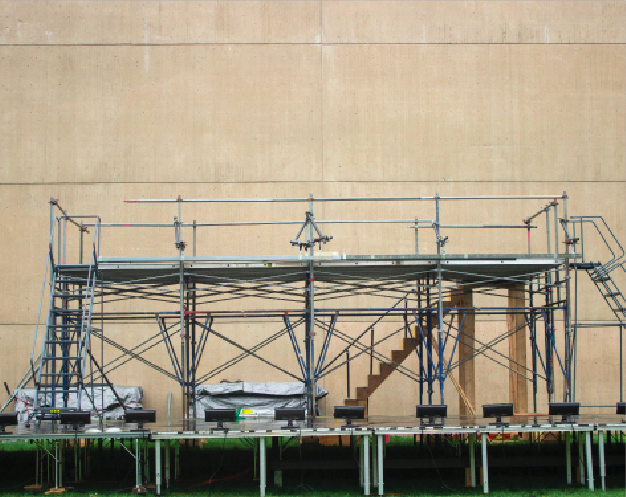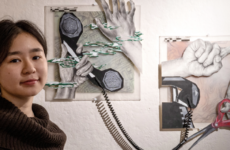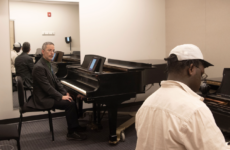
Photos by Linda Phan/The Choate News
Envision a stage with mysterious lighting and eerie noises surrounding a desolated mansion. Imagine another stage with no music, lighting, or props. The distinction between the two is apparent. This is the magic of technical theatre — it draws the audience to a particular setting, a specific time period, and a certain mood. Its artistic expression is beyond spoken words, as it enables both the artists and the audience to position themselves into the theatrical narratives.
Mr. Mark Gostomski, Technical Director at the Paul Mellon Arts Center (PMAC), reflects on the tech theatre program on campus.
Ryan Kim: What is tech theatre?
Mr. Mark Gostomski: Tech theatre is anything that is backstage during the show, including lighting, sound, scenery, costume, props, production, puppetry, and special effects.
RK: How often does it meet and which terms is it available?
MG: It is available every term with two sections: costume and props, and scenery and lighting. About particular schedules, that is dependent upon the term and the production being done. Certain productions have more needs than others and may need more things done. It is during the afternoon time slot — same time as intramurals or sports.
RK: What are students expected to do?
MG: I’m in charge of the scenery and lighting section. For scenery and lighting, you will be learning how to do woodworking, work with tools, and operate theatre systems (including lighting, sound, fly system for flying scenes, and more).
It’s getting really hands-on into aspects of backstage theatre. Something I find super fun is that it voyages across so many different disciplines: in carpentry we could be talking about math and physics for constructions, for machinery we could be discussing engineering and robotics, and for painting we will be talking about the visual arts
RK: Is prior experience required?
MG: No, and it can be taken multiple times!
RK: What’s something about tech theatre you wish more students knew about?
MG: There’s so many other disciplines that feed into it, and you can use the skills that you already have, just in new and different ways. This is very hands-on, getting involved, and your work will always be seen on stage. Everything you do will be used for the production that term, so you truly are a part of what is happening with the production.
Several students also reflected on their experience with the tech theatre program.
Samuel Qin ’22 participated in tech theatre two years ago, when he worked with back-end construction and helped man the stage ropes. He enjoyed tech theatre for its laid-back atmosphere, as he had time to chat with friends while brainstorming design ideas. “The best part of tech theatre is definitely the performances, since you get to see everything come together,” he said.
Mikey Sanagustin ’23, who operated one of the spotlights for Urinetown, said, “I am very glad I chose this as my ‘sport.’” Aside from lighting, Sanagustin also practiced woodworking to help build the stage and props. Also, he assisted in setting up the stage, which showed him the versatility of tech theatre.
Chizzy Ogbutor ’23, who gathered costumes and painted sets for Urinetown, found tech theatre enjoyable because of the fun people he worked with. Ogbutor said, “I would definitely recommend costuming to others. Personally, I think being able to know what’s going on behind the scenes, and being part of such a vital role for the musical is the best part of tech theatre.”




